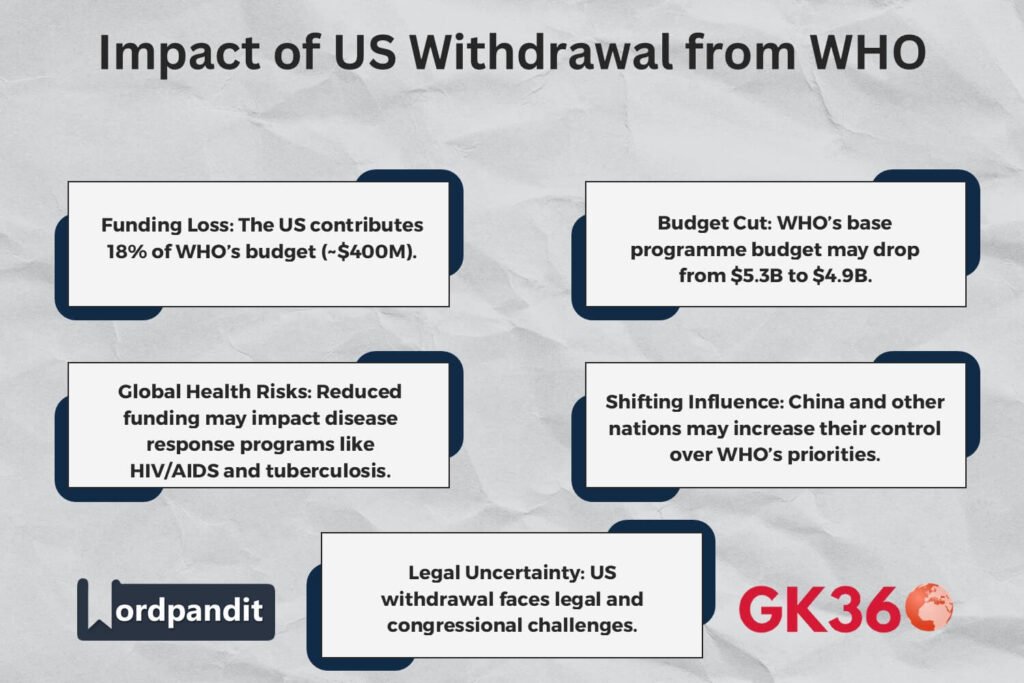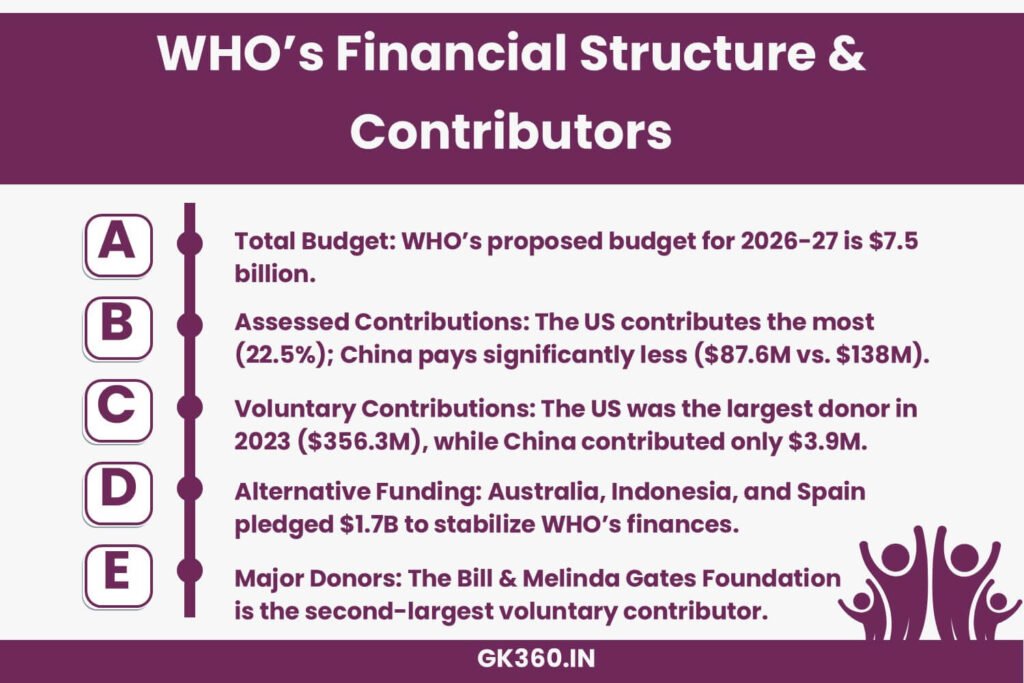WHO Funding Crisis: Impact of US Withdrawal and Global Health Challenges
Introduction: The WHO Funding Crisis
The World Health Organization (WHO) is on the brink of a financial crisis following the United States’ decision to withdraw its funding. Historically, the US was WHO’s largest contributor, accounting for approximately 18% of the organization’s budget. The abrupt withdrawal means a loss of around $400 million, which could severely impact global health initiatives aimed at eradicating polio, tuberculosis, and malaria.
This move raises serious concerns about WHO’s financial stability and its ability to address global health emergencies. Many experts argue that low-income countries will suffer the most, as WHO funds essential healthcare programs in Africa, South Asia, and Latin America.
With China and the European Union (EU) emerging as alternative sources of funding, questions arise:
- Can WHO function effectively without US support?
- Will China’s increased influence shift WHO’s priorities?
- What happens to life-saving global health programs?

Table of Contents
- Why Did the US Withdraw from WHO?
- WHO’s Financial Structure: Where Does the Money Come From?
- Global Implications of the US Funding Cut
- Reactions from WHO and Member States
- Legal and Political Ramifications of the US Withdrawal
- Future of Global Health Funding: Who Will Step Up?
- Conclusion: The Road Ahead for WHO and Global Health
- FAQ: Common Questions About WHO’s Funding Crisis
Why Did the US Withdraw from WHO?
The US officially announced its withdrawal in January 2025, citing long-standing issues with WHO’s governance and decision-making. Former President Donald Trump first threatened withdrawal in 2020, blaming WHO for its handling of the COVID-19 pandemic. His successor carried out the move, completing the process over a one-year period (to be finalized by January 2026).
COVID-19 Response Controversy
- WHO was accused of failing to hold China accountable during the early stages of COVID-19.
- Critics argued WHO relied too heavily on China’s initial data, leading to delayed global response measures.
Financial Prioritization
- The US has sought to cut foreign aid and prioritize domestic spending.
- Officials claimed WHO had inefficiencies and political biases that made continued funding unjustifiable.
Shifting Global Alliances
- The US withdrawal reduces its influence over WHO’s global health strategies.
- China and other nations could reshape WHO’s policies, leading to concerns about geopolitical control over health initiatives.
WHO’s Financial Structure: Where Does the Money Come From?
The World Health Organization (WHO) operates on a $7.5 billion budget (2026-27), which comes from two major sources:
1. Assessed Contributions (Mandatory Payments from Member States)
- The US contributed the most (22.5% of these fixed payments).
- China contributed $87.6 million, significantly lower than the US’s $138 million.
2. Voluntary Contributions (Additional Donations from Countries, NGOs, and Philanthropists)
- The US was WHO’s largest voluntary donor, contributing $356.3 million in 2023.
- China contributed only $3.9 million (0.14% of total voluntary contributions).
- Bill & Melinda Gates Foundation (BMGF) is the second-largest private donor.
💡 Without US contributions, WHO’s base program budget will drop from $5.3 billion to $4.9 billion, forcing cutbacks on global health projects.
Global Implications of the US Funding Cut
A Leadership Vacuum in Global Health
- Withdrawing US funding means reduced American influence over WHO policies.
- China could step in, increasing its political leverage over global health decisions.
WHO’s Reduced Capacity to Fight Global Diseases
- Programs tackling HIV/AIDS, tuberculosis, malaria, and polio may face drastic funding cuts.
- WHO’s ability to provide vaccines, medical supplies, and emergency response in Africa, Latin America, and Asia could weaken.
Weakened Pandemic Preparedness
- WHO’s ability to respond to future pandemics may be compromised.
- Slower detection of emerging diseases could lead to delayed global responses.
Reactions from WHO and Member States
WHO’s Official Response
WHO Director-General Tedros Adhanom Ghebreyesus has:
- ✔ Called for diplomatic discussions with the US to reconsider its decision.
- ✔ Urged other nations to increase their financial contributions to sustain WHO operations.
Global Financial Response
- 🌍 Other countries stepping in:
- Australia, Indonesia, and Spain pledged $1.7 billion in 2024 to help fill the financial gap.
- EU leaders proposed increasing their assessed contributions to ensure WHO stability.
- 🔍 Uncertain future: While these pledges help, they may not fully replace the US’s financial and strategic influence.
Legal and Political Ramifications of the US Withdrawal
📌 1. Is the Withdrawal Legal?
- The US Congress originally approved joining WHO, raising questions about whether a president can unilaterally withdraw.
- Legal experts argue Congress may need to authorize withdrawal, meaning future court challenges are possible.
📌 2. Could a Future Administration Reverse This Decision?
- A new US administration (2028 or beyond) could rejoin WHO, but restoring trust and funding levels may be difficult.
Future of Global Health Funding: Who Will Step Up?
With the US withdrawal, WHO must look for alternative funding sources:
- 🔹 European Union (EU) – Could increase its contributions to offset the loss.
- 🔹 China – Likely to expand its role, but past voluntary contributions were minimal.
- 🔹 Private Foundations (Bill & Melinda Gates Foundation, Wellcome Trust) – May support specific programs but cannot fully replace governmental funding.
⚠ Potential Consequences:
- Developing countries may lose access to critical WHO-funded healthcare programs.
- WHO’s ability to respond to future pandemics and global health threats could weaken.
Conclusion: The Road Ahead for WHO and Global Health
The US withdrawal from WHO marks a major shift in global health governance. While other nations and organizations may step up, the financial and political consequences remain uncertain.
Key Takeaways
| Aspect | Details |
|---|---|
| US Withdrawal Decision | Announced in January 2025, officially taking effect in January 2026. |
| Reason for Withdrawal | US accused WHO of mishandling the COVID-19 pandemic. |
| Financial Impact | US withdrawal could cut WHO’s budget by approximately $400 million. |
| Alternative Funding Efforts | Other nations pledged $1.7 billion to stabilize WHO’s budget. |
Related Terms:
- WHO Funding Crisis
- US Withdrawal from WHO
- WHO Budget Cut 2025
- Global Health Impact
- WHO Financial Contributors
- China’s Influence in WHO
- Global Health Leadership






